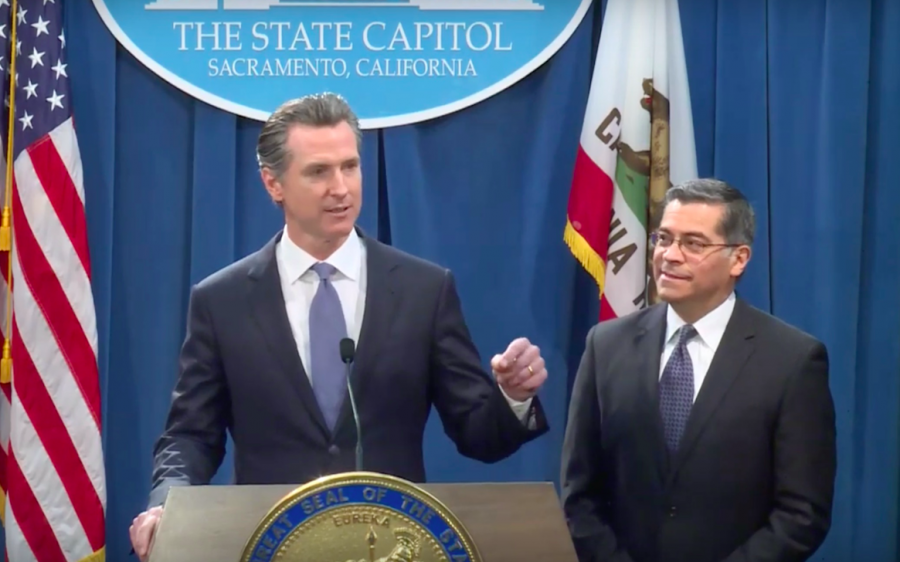California sues Trump administration over national emergency declaration
Provided by the California Department of Justice
Governor Gavin Newsom holds a press conference to announce the lawsuit. Newsom claimed President Donald Trump’s actions as unconstitutional and not based on legitimate grounds.
February 15, 2019
California governor Gavin Newsom and California Attorney General Xavier Becerra announced an upcoming lawsuit against the Trump Administration over the President’s declaration of a national emergency at the U.S.–Mexico border in a press conference. Newsom denounced Trump’s actions as unconstitutional because the president’s declaration of emergency was not founded upon sufficient grounds.
In a flurry of events this morning, President Donald J. Trump avoided a second government shutdown this year by signing a new bipartisan spending package, which allots $1.375 billion in funding for border barriers.
He subsequently declared a national emergency at the southern border, citing a “national security crisis” as the grounds upon which he will seize special executive powers to acquire further funding for the border wall.
Reiterating the necessity of a border wall to prevent “an invasion of drugs and criminals coming into our country,” Trump is planning to seek $6.5 billion more in funding through executive action, although Trump himself seemingly acknowledged the fact that the current situation did not necessarily require a declaration of emergency at a news conference this morning.
“I could do the wall over a longer period of time. I didn’t need to do this. But I’d rather do it much faster,” Trump said at the conference.
Becerra cited Trump’s own words as evidence that the president does not have the constitutional right to declare a national emergency and seize the powers of the purse, which are reserved to Congress.
“What’s perhaps most ironic about this is that even the President knows that his declaration of an emergency for the nation is dubious,” Becerra said at the press conference.
The Constitution grants only Congress the authority to regulate government spending and revenue, but under the National Emergencies Act of 1976, the president may declare a national emergency and acquire special powers that bypass the economic powers constitutionally reserved to Congress, provided that the president follow a specified set of procedures.
Newsom and Becerra argue that Trump does not have the right to invoke these powers.
“He can’t do this because the US Constitution gives Congress, not the President, the power to direct dollars—the power of the purse,” Becerra said.
Several of Trump’s allies and fellow Republicans have called the decision ill-advised, while numerous Congressional Democrats, including Speaker Nancy Pelosi, Senate Minority Leader Chuck Schumer, freshman Rep. Alexandria Ocasio-Cortez and House Judiciary chair Jerry Nadler, have vowed to fight the movement in court, citing the declaration as unconstitutional.
While House Democrats plan to introduce a measure to block Trump’s national emergency declaration, it will need major bipartisan support to pass as Democrats do not have the sufficient number of votes to pass the measure without Republican votes.
Meanwhile, California has taken its first steps towards a legal battle over the President’s decision. As Newsom is withdrawing California National Guard troops from the Mexico border who were recently stationed there in an effort by former governor Jerry Brown’s attempt to comply and assist border patrol agents, he mentioned that California plans to sue the Trump administration over the national emergency declaration.
“President Trump is manufacturing a crisis and declaring a made-up ‘national emergency’ in order to seize power and subvert the Constitution,” Newsom said in a written statement today. “Our message back to the White House is simple and clear: California will see you in court.”
Trump’s plans to divert money will remove funds from California’s anti-narcotics operations. Additionally, a declaration of national emergency potentially could divert money from fire relief in California following the wildfires that gripped the state late last year, notably the Camp Fire in Butte County.
Following Becerra’s promise to “reject [the declaration] in court the moment it touches the ground,” Newsom and Becerra are developing plans for legal action, stating that “[they’ll] be ready soon.” This lawsuit will be the 46th legal challenge filed by Becerra against the Trump administration.
“No other state is going to be impacted by this declaration of emergency more than the state of California,” Newsom said.
Following the longest government shutdown in American history, which lasted a total of 35 days from Dec. 22 to Jan. 25, President Donald Trump reached a deal to reopen the federal government until Feb. 15. As the deadline loomed, lawmakers from both parties worked towards a compromise that culminated in a sweeping spending bill, which Trump signed this morning, narrowly averting another shutdown and securing funding for several other parts of the government, including nine Cabinet departments.
The seven spending bills, which totaled to $333 billion, include $1.375 billion in funding for 55 miles of “barriers,” not walls, a distinction Democrats are strongly reinforcing. This funding is far less than the $5.7 billion Trump was asking for, leading to criticism from him at a press conference at the White House earlier this week.
“I have to study [the deal], I’m not happy about it,” the “Art of the Deal” author said of the bipartisan compromise. “It’s not doing the trick … Am I happy? The answer is no, I’m not.”
Despite his disappointment, Trump signed the measure to ensure functionality of the government on Feb. 15. After offering a few remarks on immigration from the Rose Garden, Trump declared a national emergency in order to re-allocate funds from various parts of the federal government to build over 200 additional miles of border wall.
Trump’s declaration will allow him to utilize funding allocated for military construction and use troops and other staff from the Department of Army civil works projects and apply them to civil defense projects to enforce the national defense. According to White House officials Trump will divert $3.6 billion budgeted for military construction projects on the border wall, $2.5 billion from counternarcotics programs, and $600 million from a Treasury Department asset forfeiture fund.
“This is plainly a power grab by a disappointed president, who has gone outside the bounds of the law to try and get what he failed to achieve in the constitutional legislative process. The President is not above the law … Congress cannot let the president shred the Constitution,” said Pelosi and Schumer in a written joint statement.


















![“[Building nerf blasters] became this outlet of creativity for me that hasn't been matched by anything else. The process [of] making a build complete to your desire is such a painstakingly difficult process, but I've had to learn from [the skills needed from] soldering to proper painting. There's so many different options for everything, if you think about it, it exists. The best part is [that] if it doesn't exist, you can build it yourself," Ishaan Parate said.](https://harkeraquila.com/wp-content/uploads/2022/08/DSC_8149-900x604.jpg)




![“When I came into high school, I was ready to be a follower. But DECA was a game changer for me. It helped me overcome my fear of public speaking, and it's played such a major role in who I've become today. To be able to successfully lead a chapter of 150 students, an officer team and be one of the upperclassmen I once really admired is something I'm [really] proud of,” Anvitha Tummala ('21) said.](https://harkeraquila.com/wp-content/uploads/2021/07/Screen-Shot-2021-07-25-at-9.50.05-AM-900x594.png)







![“I think getting up in the morning and having a sense of purpose [is exciting]. I think without a certain amount of drive, life is kind of obsolete and mundane, and I think having that every single day is what makes each day unique and kind of makes life exciting,” Neymika Jain (12) said.](https://harkeraquila.com/wp-content/uploads/2017/06/Screen-Shot-2017-06-03-at-4.54.16-PM.png)








![“My slogan is ‘slow feet, don’t eat, and I’m hungry.’ You need to run fast to get where you are–you aren't going to get those championships if you aren't fast,” Angel Cervantes (12) said. “I want to do well in school on my tests and in track and win championships for my team. I live by that, [and] I can do that anywhere: in the classroom or on the field.”](https://harkeraquila.com/wp-content/uploads/2018/06/DSC5146-900x601.jpg)
![“[Volleyball has] taught me how to fall correctly, and another thing it taught is that you don’t have to be the best at something to be good at it. If you just hit the ball in a smart way, then it still scores points and you’re good at it. You could be a background player and still make a much bigger impact on the team than you would think,” Anya Gert (’20) said.](https://harkeraquila.com/wp-content/uploads/2020/06/AnnaGert_JinTuan_HoHPhotoEdited-600x900.jpeg)

![“I'm not nearly there yet, but [my confidence has] definitely been getting better since I was pretty shy and timid coming into Harker my freshman year. I know that there's a lot of people that are really confident in what they do, and I really admire them. Everyone's so driven and that has really pushed me to kind of try to find my own place in high school and be more confident,” Alyssa Huang (’20) said.](https://harkeraquila.com/wp-content/uploads/2020/06/AlyssaHuang_EmilyChen_HoHPhoto-900x749.jpeg)










